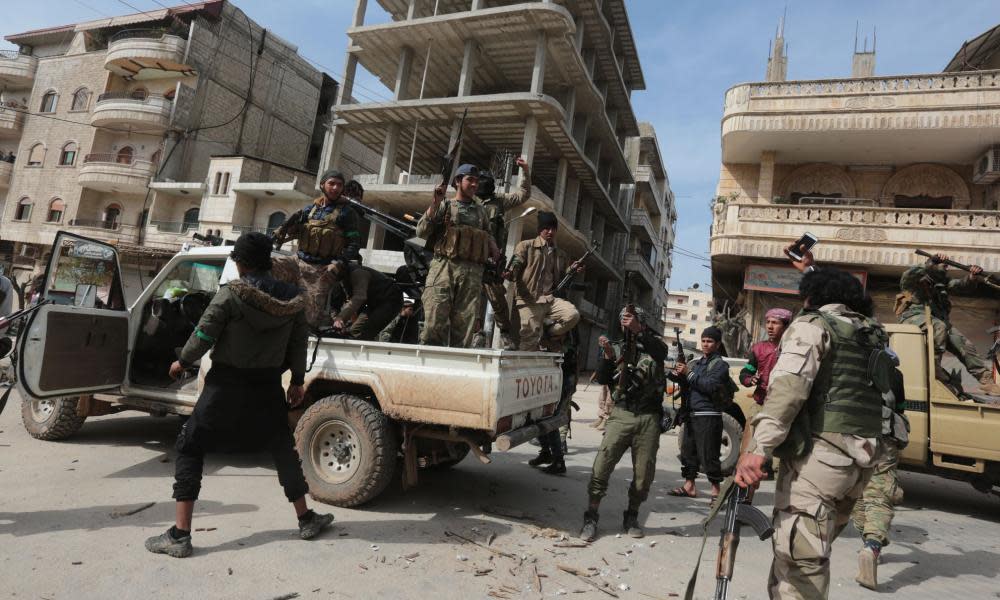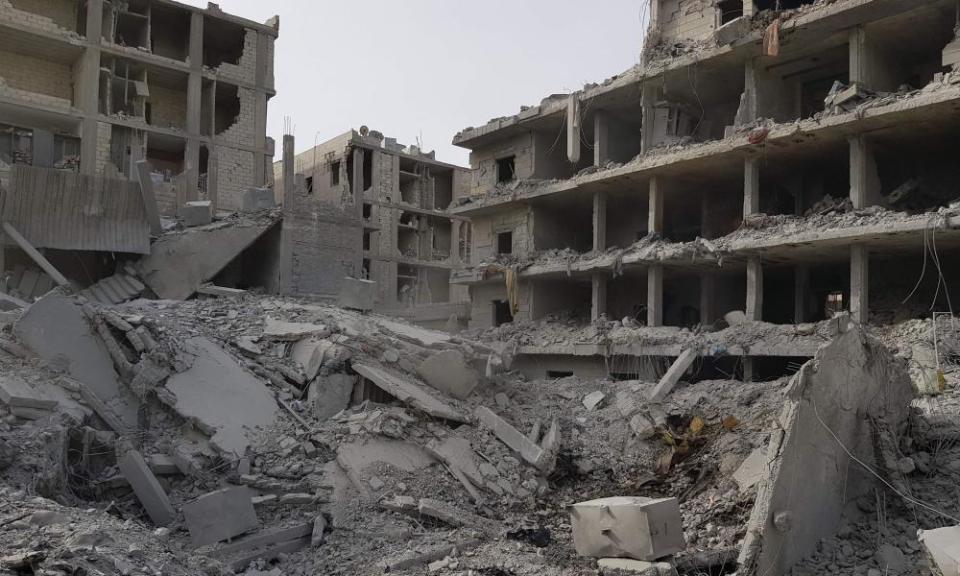Syrian rebel victory in Afrin reveals strength of Turkish-backed force

The Syrian rebel commander Abu Ahmed was smiling. His troops had played a key role in Turkey’s assault on the Kurdish enclave of Afrin in northern Syria, a fight they have won.
Abu Ahmed is a senior officer in the 10,000-strong rebel force that, with Turkish backing and instigation, took control of Afrin on Sunday after a two-month battle. His name has been changed, along with others, to freely discuss their sensitive relations with their backers in Ankara.
Amid the series of defeats at the hands of the Syrian government of Bashar al-Assad and its Russian backers, victory in Afrin is one of the rare successes for rebel fighters in recent years.
Their quick victory in a fight against an adversary trained and armed by the US, which had ousted Islamic State from vast tracts of territory, underlined the growing power of a rebel army in Syria’s north, armed and paid by Turkey, that now comprises three legions and controls a growing swathe of territory.
Throughout northern Syria, bands of disparate rebel groups have fallen in line behind the Ankara-backed project, which has imposed military discipline on fighters that Washington, while covertly backing, had deemed too fractious and weak to defeat Isis.
“I mean, even Bashar al-Assad didn’t succeed in uniting us,” said one rebel official. “We are militarily and politically weaker than the regime, which is using scorched-earth tactics and areas are falling while we are accusing each other of betrayal.
(March 1, 2011)
Unprecedented protests demand civil liberties and the release of political prisoners after four decades of repressive rule by the Assad family. The regime represses demonstrations in Damascus and the southern city of Deraa but protests continue.
(July 1, 2011)
Defecting army colonel Riad al-Asaad sets up the Turkey-based rebel Free Syrian Army. Islamist groups join the revolt.
(March 1, 2012)
Regime forces take control of the rebel stronghold in Homs after a month of bombardment. Other bloody operations are carried out, notably in the central city of Hama, after massive anti-regime protests.
(July 1, 2012)
FSA fighters launch a battle for Damascus but the government holds firm.
(August 1, 2013)
More than 1,400 people die in a chemical weapon attack on rebel-held districts near Damascus.
(September 1, 2013)
The US and Assad ally Russia agree a plan to eliminate Syria's chemical weapons, averting punitive US strikes against the regime.
(January 1, 2014)
Hostilities between jihadists and rebel groups turn into an open war in the north. The group that will become known as Islamic State takes Raqqa – the first provincial capital to fall out of regime control – from rebel forces.
(September 1, 2014)
A US-led coalition launches airstrikes against Isis in Syria. The strikes benefit Kurdish groups, which since 2013 have run autonomous administrations in Kurdish-majority areas.
(September 1, 2015)
Russia launches airstrikes in support of Assad's troops, who are on the back foot. Russian firepower helps turn the tables for the regime, which begins to retake rebel-held territory.
(December 1, 2016)
The regime retakes Syria's second city, Aleppo.
(January 1, 2017)
Russia and Iran, as backers of the Syrian regime, and Turkey, a supporter of the rebels, organise talks in Kazakhstan, between representatives of both sides. The process leads to the creation of four "de-escalation zones".
(April 1, 2017)
A sarin gas attack on the rebel-held town of Khan Sheikhun kills more than 80 people, prompting Washington to attack a regime airbase.
(January 1, 2018)
Further complicating an already drawn-out conflict, Turkey launches an operation against the Kurdish People's Protection Units which, with US support, played a key role in beating back Isis.
(February 1, 2018)
Regime launches a ferocious assault on the remaining rebel-held enclave near Damascus, eastern Ghouta. In under four weeks, the Russian-backed onslaught kills more than 1,200 civilians.
“The people now hate all the rebel factions, and this will change when there is a unified army,” he added.
Critics, including within the opposition, say they are no more than mercenaries fighting Turkey’s battles, pitting Syrians against Syrians. Their fighters, while acknowledging they have no ultimate say in the broad contours of the war, disagree.
They say their new army, now close to 20,000 strong, will be able to take on al-Qaida-linked militants in the northern province of Idlib. They say the force, as it grows, will strengthen their hand in peace negotiations in Syria, even as Assad’s Russia-backed forces claw back territory around the country. And, if a deal is reached one day to oust Assad, they say they can work with the government’s army to impose order in all of Syria.
“If Assad stays with his apparatchiks this will not be over, but if there is a transition away from Assad and his top echelons in the leadership, we can work together with the army with the support of the international community to impose security on all the liberated areas,” said Abu Ahmed’s political aide. “And if we are tricked, the weapons are still there, and the fighters are there, and it will be a fight to the death.”
Turkey announced the launch of the assault on Afrin in January, after the US said it would raise a border force to patrol Syria’s frontiers from Kurdish militias that had fought with Washington against Isis and liberated the city of Raqqa. Turkey, a Nato member, had long tolerated the American alliance with the People’s Protection Units (YPG), which Ankara considers the Syrian branch of its own Kurdish separatist insurgency, because of American assurances that it was temporary.
The battle for Afrin displaced tens of thousands of people and cost nearly 300 civilian lives by the estimates of war monitors, and the rebels’ arrival was accompanied by widespread looting of homes and shops in Afrin city. It also raised accusations that Turkey and its rebel allies intend to change the demography of the area by settling Arab refugees to outnumber indigenous Kurds.

It was Ankara’s second major campaign in Syria. In August 2016 it launched Euphrates Shield, an operation that relied on Syrian rebel groups to clear towns controlled by Isis from the border and halt Kurdish expansion west of the Euphrates river.
After the campaign, Turkey sought to better organise and train the rebels allied with it, providing them with training, arms, and even a monthly stipend for the fighters in the military factions that join the alliance. The three legions that form the rebel army, which nominally falls under the authority of a barebones transitional government formed with Turkish backing, are led by defected Syrian soldiers who are themselves advised by senior Turkish military officers, according to rebel officials and commanders.
Rebels say they conducted the vast majority of the fighting in Afrin, backed by Turkish artillery and fighter planes. They are convinced that the battle was an overall strategic victory, because it will open a ground corridor into nearby Idlib province, a stronghold for al-Qaida-linked militants, and link them up with other rebel factions that want to join the coalition there.
While acknowledging their lack of agency in determining the course of the war, they see no problem in aligning themselves with Ankara, given what they see as a convergence of interests in Syria. The prospect of a united rebel army, as the war in Syria enters its eighth year, appears to overpower their dependency on an ally with whom their goals might not always align.
“The main goal is to build an army for the opposition, and we built a nucleus,” said one rebel commander. “The regime doesn’t make its own decisions, it’s basically a military faction like all the rebels, and neither does the opposition. When the international powers agree, [the war in] Syria will be over, and when that happens, time will help everyone forget.”

 Yahoo News
Yahoo News 
